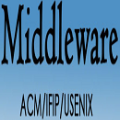Decentralised Machine Learning (DML) enables collaborative machine learning without centralised input data. Federated Learning (FL) and Edge Inference are examples of DML. While tools for DML (especially FL) are starting to flourish, many are not flexible and portable enough to experiment with novel systems (e.g., RISC-V), non-fully connected topologies, and asynchronous collaboration schemes. We overcome these limitations via a domain-specific language allowing to map DML schemes to an underlying middleware, i.e. the \ff parallel programming library. We experiment with it by generating different working DML schemes on two emerging architectures (ARM-v8, RISC-V) and the x86-64 platform. We characterise the performance and energy efficiency of the presented schemes and systems. As a byproduct, we introduce a RISC-V porting of the PyTorch framework, the first publicly available to our knowledge.
翻译:分散式机器学习(DML)使合作机器学习无需集中输入数据就能进行协作性机械学习。联邦学习(FL)和边缘推论是DML的例子。虽然DML(特别是FL)的工具开始蓬勃发展,但许多工具不够灵活和便携,不足以试验新式系统(例如RISC-V)、不完全相连的地形学和不同步的合作计划。我们通过一个特定域名语言克服了这些限制,从而能够将DML计划映射到一个基本的中间软件,即平行编程图书馆。我们通过在两个新兴建筑(ARM-v8、RISC-V)和x86-64平台上制定不同的工作DML计划来进行实验。我们描述所提出的计划和系统的性能和能源效率。作为副产品,我们引入了RISC-V将PyTorch框架移植到我们的知识中第一个公开的PyTorch框架。



